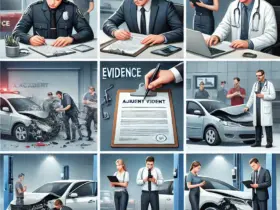Key Takeaways
- Understanding Iowa’s car accident laws is crucial for drivers to ensure legal protection and accountability.
- Legal processes and compensation claims can be streamlined with knowledge of specific state laws.
- Hiring a car accident lawyer can significantly impact the outcome of insurance claims and legal procedures.
- Stay informed about statutes, liability, and steps post-accident to navigate the legal landscape better.
Introduction
With its rolling landscapes and bustling cities, Iowa is a state where driving is necessary for many. At the same time, open roads offer freedom; they also have responsibilities, mainly when accidents occur. Knowing Iowa’s traffic laws is essential for more than just following the law; it helps ensure everyone’s safety, security, and right to justice. This guide is intended to help you understand the intricacies of Iowa’s auto accident laws and emphasize the value of having an experienced auto accident attorney on your side.

Essential Aspects of Car Accident Laws
Every state in the U.S. has its own rules and regulations governing road safety and accident protocols, and Iowa is no exception. Determining fault is a fundamental aspect of Iowa car accident laws and is crucial in handling claims. Due to the comparative fault system in place in Iowa, parties involved in an accident may share some of the blame.
The percentage of fault attributed to each party can be used to modify compensation, which affects settlement amounts. For example, a driver may still be entitled to 80% of their damages even if they are found to be 20% at fault for the collision. Understanding this law helps drivers prepare for the realities of compensation and liability.
Statutes and Limitations
Knowing time limits for filing lawsuits related to car accidents is critical. According to Iowa law, the statute of limitations for personal injury claims arising from auto accidents is two years. Accordingly, drivers must file a lawsuit two years before the collision date. Failing to act within this period may result in losing the right to seek compensation. It is, therefore, imperative for accident victims to take prompt action and understand these timelines to protect their legal rights.
Post-Accident Steps and Legal Responsibilities
Immediately following an accident, several legal obligations arise. Iowa law requires drivers involved in an accident to stop immediately and reasonably assist injured parties. Failure to do so can result in severe penalties, including fines and imprisonment.
The crucial steps include exchanging information with the other driver(s) involved and contacting law enforcement to report the accident. These actions comply with legal requirements and ensure adequate documentation for insurance and legal purposes. Understanding these responsibilities situates a driver favorably for subsequent claims and legal actions.
Insurance Requirements and Compensation Claims
Drivers in Iowa must have a minimum amount of liability insurance coverage. This covers bodily injury up to $20,000 per person, bodily injury up to $40,000 per accident, and property damage up to $15,000. This insurance covers medical expenses, repair costs, and other damages in the event of an accident.
Claiming compensation often involves complex negotiations with insurance providers, who may seek to minimize payouts. Here, an understanding of policy terms and the ability to communicate accident details effectively become invaluable. Drivers who know their rights under Iowa law can navigate these discussions more effectively, pursuing rightful compensation for their damages.
The Role of a Car Accident Lawyer
Engaging a car accident lawyer can be instrumental in the aftermath of a car accident. These legal professionals offer expertise in navigating the intricacies of Iowa’s car accident laws, ensuring that victims receive fair treatment. Lawyers can assist in gathering evidence, securing witness statements, and negotiating with insurance companies to maximize client compensation.
A lawyer also offers clients vital direction during the legal process, assisting them in comprehending their options and coming to well-informed decisions. When disagreements over fault or negotiations break down, an experienced attorney can take the matter to court and use their knowledge of Iowa law to represent their client effectively. This support can significantly reduce stress during a trying time, freeing victims to concentrate on their recovery.
Conclusion
Understanding the car accident laws of Iowa is essential for all drivers. These laws dictate immediate requirements following an accident and govern long-term processes such as liability assessment and compensation claims. By familiarizing themselves with these legal frameworks and considering the benefits of professional legal counsel, Iowans can confidently navigate the legal system and better protect themselves. Emphasizing safety, legal literacy, and preparedness ensures that every journey on Iowa’s roads is as secure and just as possible.





